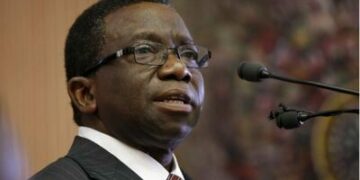President of the Economic Community of West Africa States (ECOWAS), Omar Alieu Touray, has disclosed plans by the regional bloc to activate 260,000 counter-terrorism brigade.
Touray spoke at the African Chiefs of Defence Staff summit 2025 with the theme: “Combating contemporary threats to regional peace and security in Africa: The role of strategic defence collaboration,” holding in Abuja.
The ECOWAS president, who represented by the Commissioner for Political Affairs, Peace and Security, Ambassador Abdel-Fatau Musah, said the Community requires USD2.5 billion for the activation and provision of logistics as well as financial support to frontline troops in states facing terrorism.
LEADERSHIP reports that 36, out of the 54 African countries were represented at the summit.
While Niger Republic representative honoured the invitation, Mali and Burkina Faso were conspicuously absent which might not be unconnected with the political tension between the countries and ECOWAS.
Touray noted that no region in Africa is spared the scourge of terrorism, civil and predatory wars, organised crime and underdevelopment.
He stated that while these various crises may be local, they require a coordinated continental response, with the African Union serving as the glue and the ultimate coordinating hub for these endeavors.
“There is no gain saying that West Africa, in particular the Sahel sub-region, has emerged as the epicentre of global terrorism, with several analytical surveys indicating that the Sahel accounted for 51% of global terrorism deaths in 2024 alone,” he said.
He therefore unveiled that the ECOWAS Heads of Government was in the process of activating a 260,000 rapid deployment counter-terrorism brigade, and to provide logistics and financial support to frontline states combating terrorism.
“While ECOWAS remains firmly committed to raising its 5,000-man brigade under the auspices of the African Peace and Security Architecture and more particularly the Continental Standby Force, the activation of this rapid deployment force has become a necessity given the asymmetric security dynamics in the region.
“We are conscious of the fact that this bold initiative requires the necessary financial resources and capabilities to make it a reality.
“To this end, ECOWAS will be hosting a meeting of the Ministers of Finance and Defense to agree on the country’s funding modalities to raise an annual budget of USD2.5 billion for the activation of the regional counter-terrorism force,” he said.
By this initiative, he said ECOWAS was also “throwing the gauntlet to bilateral and multilateral partners to complement this daring regional initiative.
“In particular, we hope that this summit will, through the African Union, send a clarion call to the United Nations to redeem the pledge made under United Nations Security Council Resolution 2719 of December 2023 to fund 75% of African-led peace support operations,” he said.
Speaking further, he said the regional bloc, besides the counter-terrorism effort, was also pursuing the operationalisation of its integrated maritime security with the establishment of three integrated maritime centres across the region and an international maritime coordinating centre in Abuja.
Other is an in-site strategy on countering transnational organised crime, among others.
In his remarks, former Minister of External Affairs and former Nigeria’s Permanent Representative to the United Nations, Professor Ibrahim Gambari disclosed that there are over 1,000 insurgency groups operating within the African continent.
He said, “According to some research work done by the African Research Network for Regional and Global Governance Innovation with headquarters in Savannah Centre for Diplomacy, Democracy, and Development here in Nigeria, there are now over 1,000 insurgency groups in Africa, and the number keeps rising and the majority of our regional economic commission are actually dealing with banditry and terrorism and other forms of insurgencyhe said.
Gambari called on African nations to first secure their various nations before securing the region and continent at large.
According to Gambari, African nations must strengthen defence industries and own its technologies in an effort to address threats.
He further urged African nations to design and build own security architecture that guarantees human security.
He however, expressed the hope that “Africa’s collective security can only be enhanced with active, practical, and proactive collaboration at regional and continental levels.
“There must be synergy in military cooperation, promotion of common training, promotion of common doctrinal concepts, sharing of intelligence, the interoperability of armaments, but also capacity building, particularly in air lifting, all of which are essential for operationalisation of the African standby force.
“We must also upgrade and strengthen our defense industries and all our technologies in order to avoid control from external forces,” Gambari stressed.





